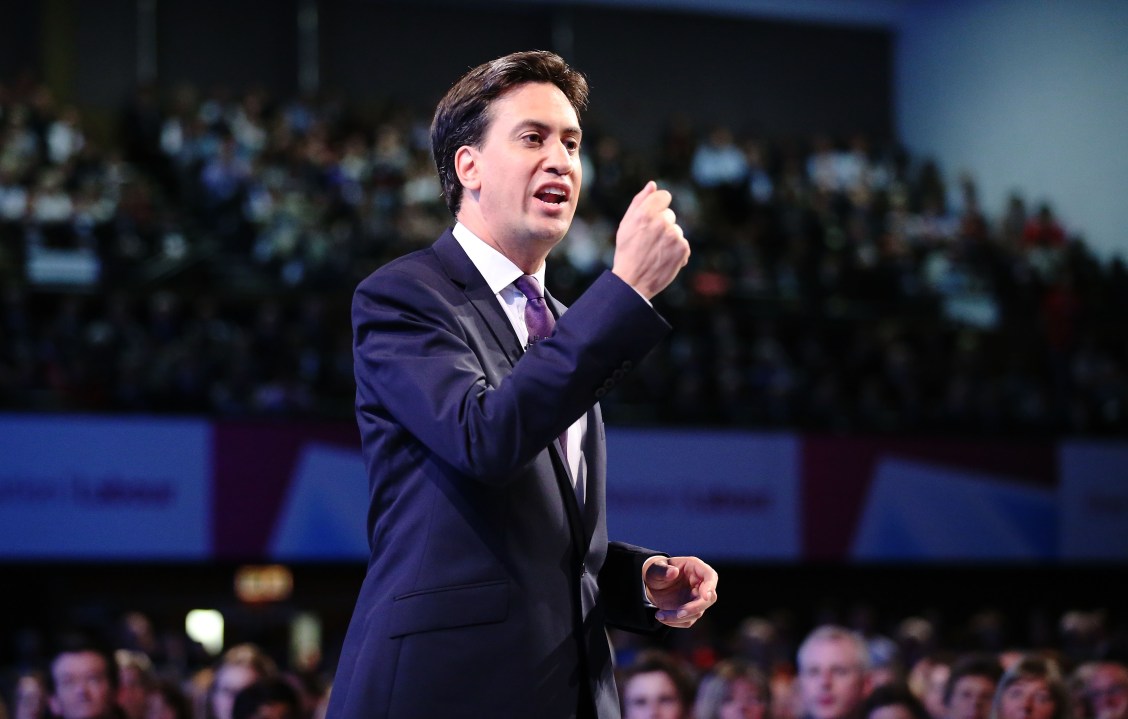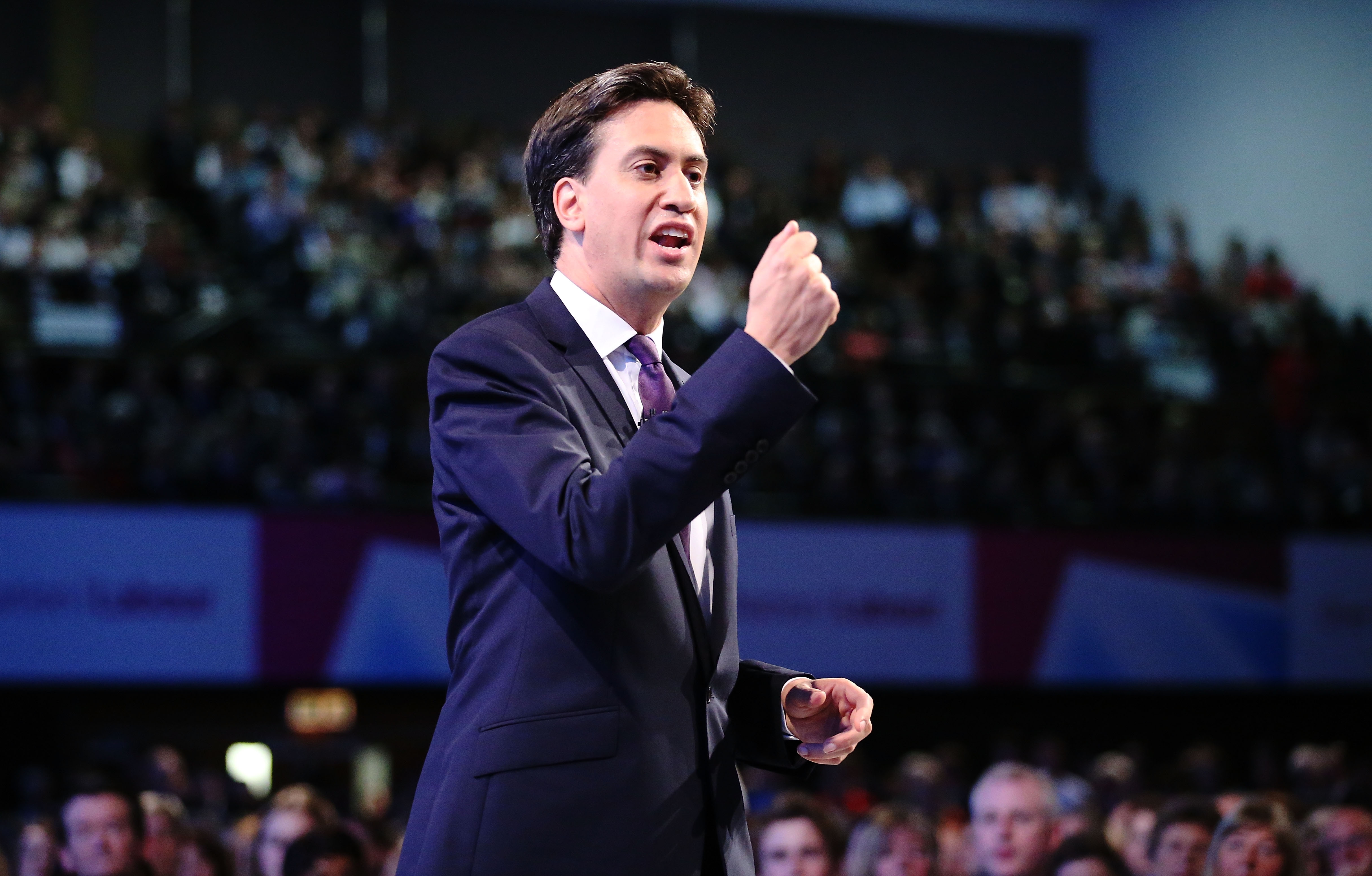Ronald Reagan once quipped that “The nine most terrifying words in the English language are, ‘I’m from the government and I’m here to help.” As was so often the case the Great Communicator was only half-joking. He knew government had important jobs to do, jobs only government could do. What was needed was a rebalancing. Government had become too invasive. It needed pruning. (Never mind that not much pruning took place; the rhetoric and the positioning was what mattered.)
I didn’t watch Ed Miliband’s speech to the Labour party conference this afternoon but no-one, I think, would say he possesses a Reaganesque delivery. But he was in Brighton to tell the hard-pressed, plain people of Britain that government is back (a straw man admittedly since it never went away) and, more importantly, that it is on your side. It is here to help. For an Oxford, LSE and Harvard wonk, Ed Miliband is a surprising kind of populist. But this was his message: there needs to be a rebalancing. Britain needs correcting. The government is on your side in a world in which you often seem powerless.
Actually his speech reads surprisingly well and reading it, unusually, you get a sense of who Ed Miliband really is. I say unusually because most of these conference speeches are, like most Presidential State of the Union addresses, utterly interchangeable and instantly forgettable.
So this was a good speech. And perhaps an effective one too. That’s not an endorsement of its content, merely an appraisal of its political strengths. It may have been, as James says, the most left-wing speech delivered by any Labour leader since the days when Neil Kinnock lost elections but let’s not allow ourselves to be carried away. It was hardly a declaration of revolution.
Capping domestic energy prices and issuing a “use it or lose it” challenge to would-be developers were revealing less because they demonstrate Miliband’s hostility to markets and private property (though they certainly do that too) but because they served to illustrate his broader theme: he is on your side, the Tories are not.
Perhaps it is a risk. The safer play – at least for now – might be to move cautiously for fear of blowing Labour’s lead in the polls. But if the economy really does recover strongly next year that advantage – or a crucial portion of it – may evaporate quickly. So Labour needs to begin defining its election message now. Britain can do better than this is not an innovative slogan but Tories should not doubt its plausibility.
Sure, Miliband glossed over the fact that his party was in power when the Great Crash happened (a correction made worse than it might otherwise have been by Labour policy) but you would expect him to skate past that. Similarly, high energy prices are, as Matthew Sinclair says, at least in part a consequence of decisions taken by one Edward Miliband when he was Energy Secretary. But so what?
And, of course, Miliband’s idea for confiscating private property if the state deems property owners are failing to make the best use of their assets is just as illiberal a proposition as one might expect from him. The lack of new houses is actually a problem of government, not a feature of market failure. Sort planning and zoning and you go some way towards addressing the problem.
But, again, that doesn’t really matter because the detail is less important than the broader message Miliband wants to communicate. He is on your side and David Cameron is not.
In this respect he may be on to something. Reagan famously asked Americans to consider whether they are better off than they were four years previously. Many of them concluded that, actually, they were not. It was time for a change in Washington. Miliband thinks he can perform the same trick in London.
David Cameron and George Osborne have made it easier for him. Raising the threshold above which workers become liable for income tax is a good idea but it is a Liberal Democrat policy. Cutting the top rate of income tax paid by only the super-wealthy was a rotten idea but it was a Conservative policy. (By rotten I mean, rotten politically and regardless of its impact on the Treasury). Politics, they say, is a matter of priorities. The Prime Minister chose his poorly. Are you mad as hell about this, asks Miliband, and if not why the hell not?
So Miliband wanted you to believe that it doesn’t have to be like this. Sure, Labour will have to be careful with the public finances (snigger ye not) but being responsible is not the same as being fatalistic or supine. There is an alternative.
There is, I think, still a sense that something somewhere has gone rather wrong. Politics has drifted away from the people and many voters think their voices don’t count (which is also why Miliband’s desire to make Labour a mass movement again is actually rather important). The cost of living like this should be a winning argument for Labour.
Cameron is not by style or inclination a bruiser and, frankly, it is hard to think of Miliband in those terms either. Nevertheless in his own way he wants to convince you that he’s prepared to take on powerful and vested interests. Whether that’s Rupert Murdoch or the Trade Unions, the energy companies or the City of London Miliband wants you to think he’s the guy to make a stand. Even one on principle.
His message is, in the end, another simple one: The people against the powerful. He doesn’t want you to worry too much about the detail (with good reason) he just wants you to know that he’ll be a Prime Minister who will reclaim government for the people. He may go further in the future and position himself as the champion of democratic legitimacy betting that in a battle between parliament and Big Business the people will side with parliament. Now that might really be radical.
Again, the idea of Ed Miliband as a kind of British Teddy Roosevelt might seem laughable (then again, Roosevelt’s high-pitched voice was pretty laughable too) but that’s the territory upon which it seems he wants to fight. It could have been Cameron’s territory once; it doesn’t seem likely to be now.
So this was, I think, an effective speech. Perhaps the best and most comprehensive Miliband has given as leader of the Labour party. The Mail and the Telegraph will shout about Red Ed but you would expect that too.
Of course, there is also a sense in which all opposition politics is the same, wherever and whenever you find it. Consider these words:
All of us together, in and out of government, must bear the burden. The solutions we seek must be equitable, with no one group singled out to pay a higher price.
We hear much of special interest groups. Well, our concern must be for a special interest group that has been too long neglected. It knows no sectional boundaries or ethnic and racial divisions, and it crosses political party lines. It is made up of men and women who raise our food, patrol our streets, man our mines and factories, teach our children, keep our homes, and heal us when we’re sick—professionals, industrialists, shopkeepers, clerks, cabbies, and truck drivers. They are, in short, “We the people,” this breed called Americans.
Well, this administration’s objective will be a healthy, vigorous, growing economy that provides equal opportunities for all Americans, with no barriers born of bigotry or discrimination. Putting America back to work means putting all Americans back to work. Ending inflation means freeing all Americans from the terror of runaway living costs. All must share in the productive work of this “new beginning,” and all must share in the bounty of a revived economy. With the idealism and fair play which are the core of our system and our strength, we can have a strong and prosperous America, at peace with itself and the world.
[…] We’re not, as some would have us believe, doomed to an inevitable decline. I do not believe in a fate that will fall on us no matter what we do. I do believe in a fate that will fall on us if we do nothing. So, with all the creative energy at our command, let us begin an era of national renewal. Let us renew our determination, our courage, and our strength. And let us renew our faith and our hope.
We have every right to dream heroic dreams. Those who say that we’re in a time when there are not heroes, they just don’t know where to look. You can see heroes every day going in and out of factory gates. Others, a handful in number, produce enough food to feed all of us and then the world beyond. You meet heroes across a counter, and they’re on both sides of that counter. There are entrepreneurs with faith in themselves and faith in an idea who create new jobs, new wealth and opportunity. They’re individuals and families whose taxes support the government and whose voluntary gifts support church, charity, culture, art, and education. Their patriotism is quiet, but deep. Their values sustain our national life.
Now, I have used the words “they” and “their” in speaking of these heroes. I could say “you” and “your,” because I’m addressing the heroes of whom I speak—you, the citizens of this blessed land. Your dreams, your hopes, your goals are going to be the dreams, the hopes, and the goals of this administration, so help me God.
The speaker? Ronald Reagan, at his first inaugration. Now, clearly, Ed Miliband is not much of a Reaganite. That is not the point I’m making. The point is that Miliband, in his own way, is making some of the same arguments Reagan did. Some things, for sure, are universal. But this kind of pitch – this kind of optimism – is easy to mock and easier still to underestimate. A people tired of the status quo, tired of grinding struggle, may listen to alternatives.
If people listened to Ronald Reagan when he praised the Quiet Bat People might they not afford Ed Miliband the same courtesy? If Miliband is an improbable populist he’s also an unlikely gambler but, as of today, he’s shown that he’s both.








Comments